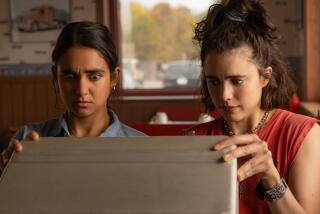Film Review: ‘Lovelace’ revisits a hardcore touchstone
- Share via
In 1972, a cheap ($25,000) hardcore porn film named “Deep Throat” became all the rage among the sort of middle-class New Yorkers who previously would not have been caught dead at a porn theater. When the New York Times wrote about the phenomenon, the film was validated as acceptable... even hip. Some of its popularity was due to its gimmick and to its lame, if good-natured, humor. But it was also simply the right film at the right time; following the explosion of openness about sex in the ‘60s, the culture was ready to remove some of the stigma from porn. If “Deep Throat” hadn’t come along at that particular cultural moment, some other film would have.
The name “Linda Lovelace” was forced upon its star by her handlers and producers, who correctly assessed it as more salable than “Linda Boreman,” her real name. In “Lovelace,” the new biopic from the team of Rob Epstein & Jeffrey Friedman (“The Times of Harvey Milk,” “Howl”), Amanda Seyfried plays Linda as a startlingly naive girl — at least by today’s standards — from a cold home. Her mother (a virtually unrecognizable Sharon Stone) is strict and guided by outdated conventional wisdom; her father (Robert Patrick) seems to have just tuned out.
Linda is “rescued” — frying pan to fire — by suitor-turned-husband Chuck Traynor (Peter Sarsgaard), an insecure lowlife who clearly believes that it’s within a man’s rights to beat, rape and otherwise control his spouse. The only way he can pay off some urgent debts is to pimp out Linda. It’s a step upward when — swallowing her pride — Linda is hired for “Deep Throat.” But this is the porn industry: The producers have since claimed (utterly preposterously) that the film eventually grossed $600 million, but Linda’s fee was a paltry $1,250 — and even that went straight to Chuck.
To make things worse, she had to endure a humiliating notoriety that made her a punch line for comedians, including Bob Hope and Johnny Carson, both of whom we see in clips. (Of course, it also provided the code name for Woodward and Bernstein’s most important Watergate informant.) She was only able to regain some of her shattered identity after divorcing Chuck, quitting porn, writing several memoirs and finally becoming a feminist antiporn crusader.
Epstein & Friedman come from the world of documentaries; they moved to a form of historical recreation in the Allen Ginsberg biopic “Howl.” Now, together with writer Andy Bellin, they take some notable liberties with the facts, in order to make Lovelace as sympathetic as possible. (In truth, her porn career lasted longer than the mere 17 days she claims in the movie.)
It’s a tawdry story, similar in some ways to “Star 80” but without quite so tragic an ending. (Eric Roberts, who played the crazed husband in that one, shows up briefly in “Lovelace” as a polygraph analyst.) The filmmakers have assembled a remarkable cast, but fans of Roberts, James Franco and Chloë Sevigny should know going in that their idols appear on screen for maybe two minutes, three minutes, and 20 seconds, respectively.
There is excellent work from the more significant supporting players, including Stone, Patrick, Juno Temple, Chris Noth, Bobby Cannavale, Hank Azaria and Debi Mazar. But it’s the two leads who are responsible for most of the movie’s strong points. Sarsgaard does very good seedy, and Seyfried is convincing as a woman trying to seize her life back after a string of bad decisions.
--
ANDY KLEIN is the film critic for Marquee. He can also be heard on “FilmWeek” on KPCC-FM (89.3).
More to Read
The biggest entertainment stories
Get our big stories about Hollywood, film, television, music, arts, culture and more right in your inbox as soon as they publish.
You may occasionally receive promotional content from the Los Angeles Times.










